Association for the support to people with intellectual disabilities of the City of Novi Sad (Association MNRO Novi Sad) was established in 1961, and has since then been working on providing support, social integration and advocating the rights of people with developmental disabilities and their families.
Katarina Vukelić, the Association President, and Danijela Mandić, the Day Center Coordinator, have told us more about the activities and achievements of the Association.
How was Association MNRO Novi Sad established? What was the initial idea and how did your mission take shape?
Katarina: Association MNRO Novi Sad was established at the initiative of parents, way back in 1961.
At the time, the city had no services and activities adapted to people with intellectual disabilities, and this was a unique place to organize activities and gatherings, to exchange experiences and knowledge of the families of children with mental disabilities.
It all started with the parents’ wish to improve the position of their children and the quality of their life. It was difficult to find premises, funds and experts, but parents’ love conquered all obstacles, gathered a working group and established the Association. Today, we are grateful for that enthusiasm which remains our guiding light.
In the meantime, we have introduced essential services and various other services, and this is the model that has been functioning and continuously improving for the past 16 years. In the same way, the mission and the vision of the Association has formed to address the burning issues parents/guardians face, and for 60 years, the Association has been continuously trying to make things easier for them and offer them a better and richer life.
Danijela: Association MNRO Novi Sad was established in June 1961. It was created by the parents of children with intellectual disabilities living in the territory of Novi Sad, whose children went to ‘Milan Petrović’ School and who wanted to empower themselves and their families through joint social activities.
At the time, there were a lot of unknowns and stigma: their children were considered ill, had to undergo treatment, parents were recommended to put their children into homes as the best solution, as it was thought they would not be able to take care of them.
We can rightly call the founders of our association forerunners and brave people, who stood out with their perseverance, their life strength, and who launched irreversible changes we foster in our association to this day.
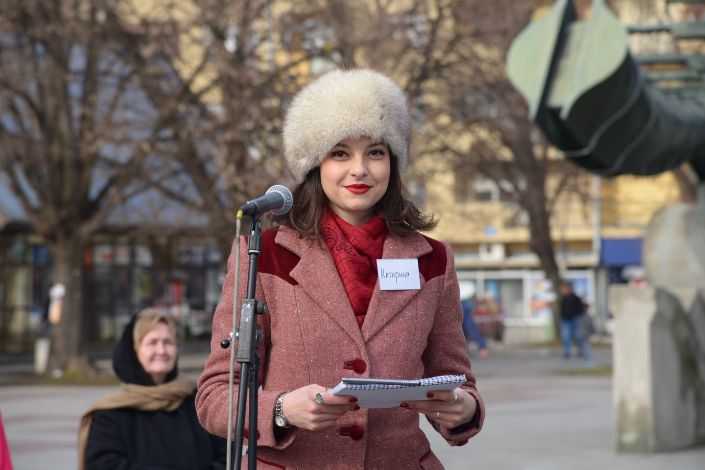
Katarina Vukelić
What was your personal motivation to work in the non-profit sector?
Katarina: I found my motivation to come and work for the Association during my studies. I wanted to dedicate my time to giving meaningful contribution to the community, and that is how I started volunteering. Given that I learned a lot during my volunteering years about the work and the functioning of the Association, being involved in various projects and workshops, I was offered to work as an expert associate, and then, in time, I became one of the official employees.
I am very pleased that life has taken mi in that direction, and I always do my job with love and pleasure. Of course, there are many challenges and difficulties we face, but for me, the greatest enthusiasm is the importance of the existence and work of the Association, the impact we are trying to exert in the society, and changes we strive to make in the future.
My greatest joy of life are the things I’ve learned working for the Association. Through my work, I am constantly improving and growing, and the most important things about love, respect, humanity, various skills I’ve acquired outside the framework of formal education – I’ve learned that from my friends, the beneficiaries of our Association MNRO. They truly do give a lot, they give everything, selflessly teaching us the joy of life. Every moment spent with them is precious!
Danijela: Although I grew up in an inclusive environment, studying at the Faculty of Philosophy, Department of Pedagogy, certainly helped me direct my activities towards helping and supporting vulnerable categories of our society. At the time, it seemed to me that one of the best ways to do so is to volunteer in various non-profit organizations, where I had the opportunity to try out my skills in many activities, and simply to recognize what suits me best, what motives and drives me.
As I spent the first year in our Association, I felt such closeness and family atmosphere that I never wanted to leave. A small team and wonderful people, common goals and problems we face, the necessity of teamwork – these were my reasons to become a part of Association MNRO Novi Sad. It is interesting to note that, even today, young people who come here tell us that they feel welcomed, free and appreciated in our Association, and that is, you will agree, a motivating environment.
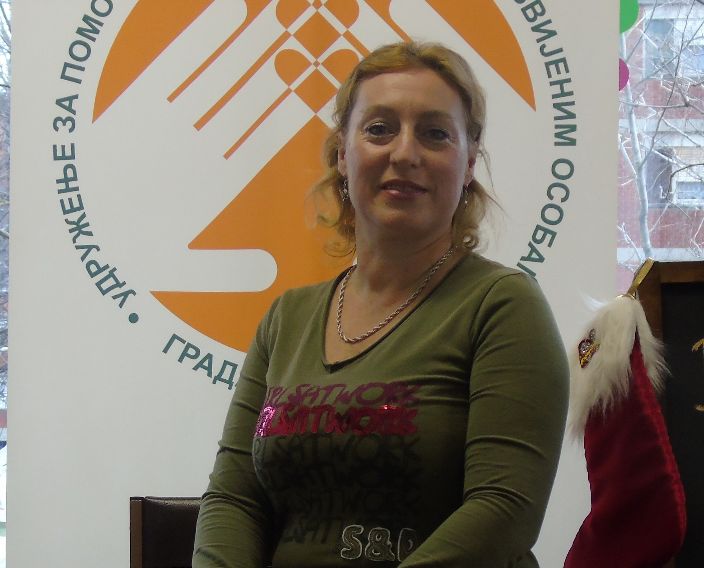
Danijela Mandić
How has the COVID-19 crisis affected the work of the Association? To what extent have your activities changed, and what has been your main focus in the recent period?
Danijela: As everywhere, COVID-19 struck in the most dynamic time of the year, in spring when we “wake up” – organize walks, museum visits, focus on spending time outside the premises of the Association.
The beneficiaries of our services and members of the Association often say that the Association is their second home, and you can imagine how hard this was for them. We maintained daily contact, both we – the employees, and our members.
I created several groups on social media, so that we could communicate with as many beneficiaries as possible, from parent groups to groups with direct beneficiaries and volunteers. First, we learned the rules of communicating in the groups – not to post too early or too late, to respect each other, to express ourselves in accordance with want we feel, and then we moved on to specific tasks, rebuses, reading, exercises, and much more.
Our volunteers helped in their own ways. To show us that we are not alone, they sent videos with tasks, read fairy tales, did exercises, thus making a significant contribution. This online time passed very quickly owing to the efforts of us all – employees, volunteers, as well as parents and guardians who shared information, interesting facts, online exhibitions and theater plays.
On May 25, we started working with our beneficiaries directly. We haven’t had a break ever since, we have divided ourselves into groups, adapted to all the requirements, and have done everything to stay open for our members who don’t have anyone but us, and there are a lot of them, trust me.
What is interesting to note is that, since May, all our beneficiaries and employees have constantly worn masks properly, washed and disinfected their hands several times a day, had their body temperature measured regularly, and disinfected the working space – this is truly commendable, and should serve as a reminder to others that anything is possible if people are willing.
Katarina: The pandemic has greatly changed the way we work, the hours of curfew were particularly challenging. We, as employees, organized Viber groups and communicated with the beneficiaries every day! But what I have to emphasize is that we were delighted and surprised by our volunteers. These young people perfectly understood how loneliness and isolation can be difficult, and organized on their own to send online tasks and challenges to beneficiaries, make videos with beautiful messages and even physical exercises, sending our beneficiaries the message that they are not alone, that someone is thinking of them, that love doesn’t disappear when a dangerous virus comes, and that we are all still together. This was extremely significant, and I would like to use this opportunity to thank all our volunteers and employees. We didn’t conduct training courses, there was no time to think and organize, but we still made it. Humanity and kindness won.
We are currently working, but in groups. We had to divide our beneficiaries to have fewer people in the room. This is still difficult for all of us. You know, a hug is our way of communication, and now we mustn’t get physically close to each other. But we are managing.
It is important to us that our beneficiaries are coming, that we are working, talking, that there is a continuity in our work and relationship. But, you have to admit, a birthday party is not the same without physical contact, without hugs and ear pulling. However, I must commend the beneficiaries of all our services. They are so disciplined, they perfectly understand the gravity of the situation and adhere to all mandatory measures.
We are now writing letters to each other, communicating with words, and still maintaining closeness. It means a lot to them, but also to us, you know. Our Association is still a place where we dream that everything is all right, that we wear masks because it is trendy, and that this new situation caused by the pandemic will not last for much longer. That soon we will all hug, sit at the same table next to each other, and continue living without limitations.
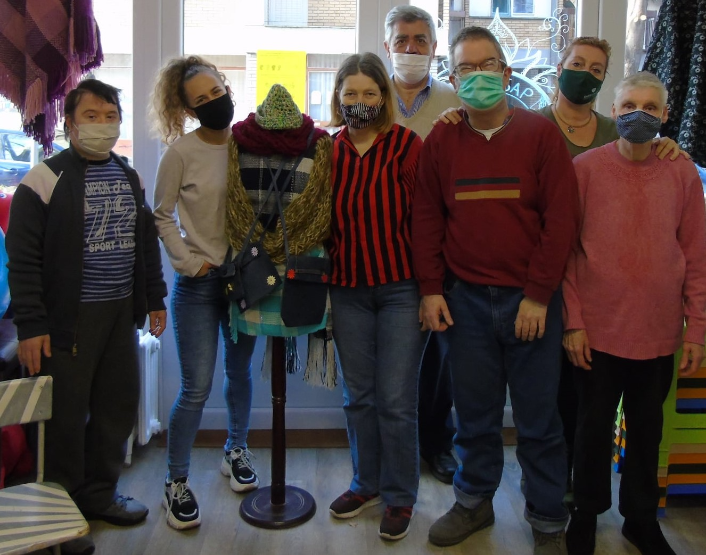
Which activities are currently in your main focus? What are the most important plans for 2021?
Katarina: Since we are constantly striving to advance and improve, we will try to do the same this year as well. In addition, we will have to work on getting donations from citizens and companies, because it is the matter of the survival of the entire organization. We have never been in such a difficult situation, and the persistence of the pandemic is making things even more difficult.
We know that not everything is about money, but as we improve our services we truly enrich the lives of our beneficiaries, provide additional help to their families, because they know their children or siblings are taken care of and have a good and meaningful life. Our association is very important for the community, but, unfortunately, in the financial sense, it is still on the margins of society.
What we strive to achieve in the future is certainly in the interest of all our beneficiaries and their families, because we try to build a better society and better conditions for all generations to come.
In 2021, we will celebrate the 60th anniversary of our successful work, this is a jubilee we are particularly proud of, because it tells a lot about us, and there are also our satisfied beneficiaries of all ages to confirm that. These are not just numbers, these are achievements, accomplishments, projects, smiles and knowledge, an extraordinary experience that has persisted since 1961, since the foundation of the Association to this day.
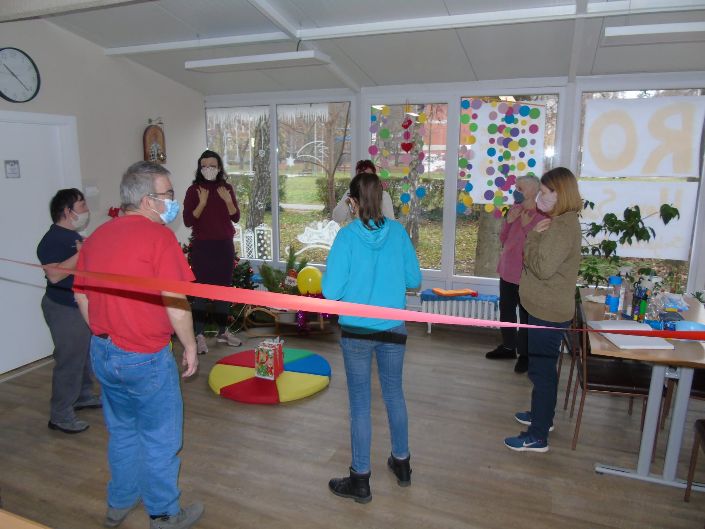
How does your Day Center work? How important is this service for the community?
Katarina: Our Day Center in today’s form has existed for full 16 years and is licensed to provide said service. This means that we are currently the only ones in Novi Sad to meet the requirements of the Ministry. There are certain regulations, protocols and ways of doing business and managing documentation that we follow. This means that our Day Center service is at the level of European standards and we are constantly striving to advance and work towards improvement. For us, this was a sort of a confirmation that we are really doing a good job, that beneficiaries get a maximum out of our Association, and that, after 60 years of the Association’s existence, we know that we have constantly been working on improving and achieving maximum quality of the services we provide.
The Day Center is open every working day from 7h to 15h, and for some beneficiaries, it is the only place they visit outside their families. Given that cultural, sport, educational, entertainment and other events and amenities in the local community are not always adapted to suit people with disabilities, particularly people with mental disabilities, our Association tries to give the beneficiaries and their families as much as possible: to offer them a wide range of activities they can participate in, the opportunity to advance in new knowledge and skills, to develop their capacities to the maximum, and to find activities according to their potential where they feel comfortable and through which they will flourish.
Danijela: Activities at the Day Center are grouped into a dozen workshops of various nature, where beneficiaries have the opportunity to find the perfect one according to their affinity, to socialize, and spend their free time in the best possible way. One of the most important tasks is certainly training our beneficiaries to lead an independent life, which is crucial for people with developmental disabilities.
Our Day Center has gathered over 60 beneficiaries with developmental disabilities, over 20 expert associates, and over 200 volunteers. These are not mere numbers, behind those numbers are entire families of people who have in some way supported and contributed to the work of our Association. Our most important donor for the Day Center service is certainly the Novi Sad City Administration for Social and Child Protection, without whose support and assistance we simply wouldn’t be able to function.
How is the work of Association MNRO financed? Which types of donors do you cooperate with and in what way? How can we all support your work?
Katarina: The work of the Association is financed by the City Council for Social Protection, Children and Family Welfare through projects. Given that the funds are modest and aimed at specific activities, we try to develop and apply for other projects, to look for donors and cooperate with other city organizations, such as the Red Cross and other associations of people with disabilities. In this way, we help each other and cooperate.
Unfortunately, it is difficult to reach donors, it seems that people are still not receptive enough to people living with their condition, who don’t have acute diseases, and who need help their entire lives. When they see them smiling and functional, they think it’s enough, and similar associations survive on enthusiasm and philanthropy. This carries difficulties, our employees burn out, run out of ideas, we use our energy on raising funds often during our free time, and therefore our families suffer, and finally, it is difficult to maintain the quality of the service we strive to keep at high standards and constantly improve.
Of course, the pandemic is taking its toll.
All citizens can engage in various ways in providing support to our Association for the support to people with intellectual disabilities of the City of Novi Sad. Through volunteering, solidarity, donations in goods and money… if you can, please support our Association with new ideas, suggestions, and follow our work.
Certainly, times are tough, particularly during the pandemic, and our Association MNRO is currently in a very difficult situation. We are fighting for survival. Unfortunately, after 60 years of existence and constant work seven days a week, we do not have enough funds to provide our beneficiaries with everything they need. Money is lacking. We are trying to support them, and if you can, as individuals, enterprises or companies, you can help us by making a donation to the following account: 340-1821-93. Or you can make donations in goods and services by contacting us via our Facebook page, by calling +381 62 496 184, or by sending an email to mnrons83@gmail.com. Certainly, we invite you to come and meet us at 83 Seljačkih Buna.
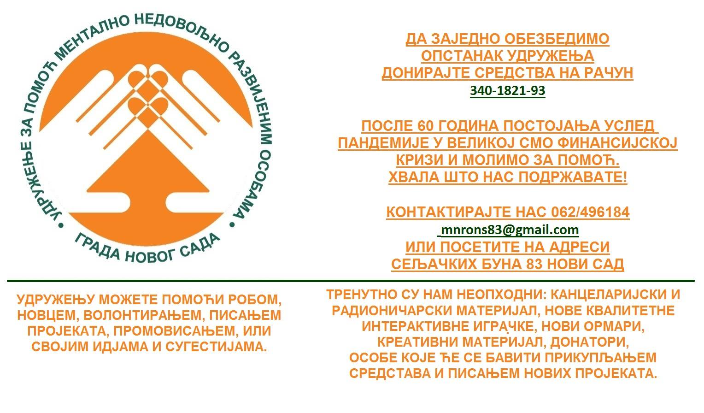
How do your Club ‘Krilce’ and Inclusive Center ‘Cvrčak’ function?
Katarina: Our Association has 4 services:
- Licensed Day Center for people with mental disabilities aged 27 and older
- Inclusive Service for Children ‘CVRČAK’
- Club ‘KRILCE’
- Association’s Volunteer Service
All our services are aimed at our beneficiaries and their families, and they are interrelated.
Our service ‘KRILCE’ is conceived as a club for gathering, meeting and networking of parents/guardians and families. It offers an excellent opportunity to exchange life experiences, which can be crucial for young parents.
For parents/guardians, we organize lectures about burning topics of their interest, we provide information, data, services they can join and exchange their experiences, which is particularly important for young parents who get information and support from older parents, and realize that they are not alone. In addition, we offer free support of psychologists and psychotherapists.
Inclusive Service ‘CVRČAK’ was the first inclusive service in our city, established at the time when the term ‘inclusion’ was not so popularized through education. This service gathers children with and without developmental disabilities, and it is open on weekends when children don’t have school and extracurricular activities. It is a unique opportunity to involve brothers, sisters, neighbors, relatives, and friends of people with mental disabilities. I also consider this one of the Association’s outstanding activities, as it deals with children from the earliest age to teenage years. These are future people, members of tomorrow's society who create our future. I am sure that neurotypical children coming to our service ‘CVRČAK’ will develop empathy, grow up without prejudices, believing that discrimination doesn’t bring anything good.
You have a large number of active volunteers. How do you engage volunteers in the work of the Association? How can people join the Association? What do volunteers bring to the Association, and what do they get from you in return?
Danijela: Volunteers have been engaged in the work of the Association since the very beginning in 1961, through various types of activities and needs. However, since 2005, they have be present as an educated group of people who want to get involved in the work with people with developmental disabilities.
These are usually students of humanities, young people eager to acquire experience and knowledge, but everyone is welcome to become our volunteer, regardless of their gender, education or age. To volunteer in our association, you only need will, wish and a little bit of time, and what you get in return will complete you and shape you as a person.
Katarina: Our Association’s Volunteer Service currently has around 20 volunteers. Anyone can be a volunteer, regardless of their age, profession and education, it is only important that they have enthusiasm, willingness to work, and an open heart. Anyone who is interested can contact the Association, and thus get all necessary information; there are also open calls for volunteers, where people can apply to participate in a certain project.
I believe that a good practical work is the greatest benefit volunteers receive. Volunteers can also form connections and friendships that last a lifetime. And the autonomy the volunteers of our Association have gives them the freedom to truly discover and express their maximum potential, which will prove valuable later in life and work. We try to provide them with free training and courses, to take them to excursions and events, to reward them for their effort and time they selflessly give us.
There are also foreign volunteers who visit us every year. There are no language barriers, because non-verbal communication and philanthropy transcend any known language! Our beneficiaries certainly enjoy meeting new people, learning new things about the world and making new friends across the globe!
Volunteers are also welcome to try developing projects, which has been an extraordinary experience so far! In general, new people give new air to our services and a special tone to our overall work. Therefore, we are particularly proud of them and their willingness to dedicate themselves and their time, and to selflessly participate in all our activities.
Do you cooperate with other non-profit organizations? If yes, which are they and in what way do you cooperate with them?
Katarina: We cooperate with other organizations of people with disabilities, we help each other and fight together for our rights and position in society. We act together with other recognized organization in our city, and we cooperate with the City Administration, make plans and arrangements.
This is also extremely important for the exchange of experiences regarding work and business activities, so we are very grateful for excellent communication among associations.
Our goal is to give all our beneficiaries as much as possible, for every person with any kind of physical, sensory or mental disability to be an equal member of society.
What are the greatest achievements of the Association so far, and what else do you wish to achieve in the future?
Katarina: The Association has so far made significant progress in improving the position of people with disabilities in society. Undoubtedly, there is a lot more to be done, from our perspective progress is slow and small, but we have made significant improvement compared to the situation of 60 years ago, when people with intellectual disabilities were completely on the sidelines, when discrimination was at a much higher level, and when society was completely uninformed and unsensitized to providing any kind of support and acceptance. Prejudices are reduced through spreading information, improving visibility and sensitizing the public to make inclusion possible and effective.
We want to achieve a complete removal of unnecessary barriers between “us” and “them”. We want every member of society to know that there are no special needs, but that everyone is special in their own way and has the right to participate in all social activities. It is up to us to give everyone a chance and allow them to express their full potential.
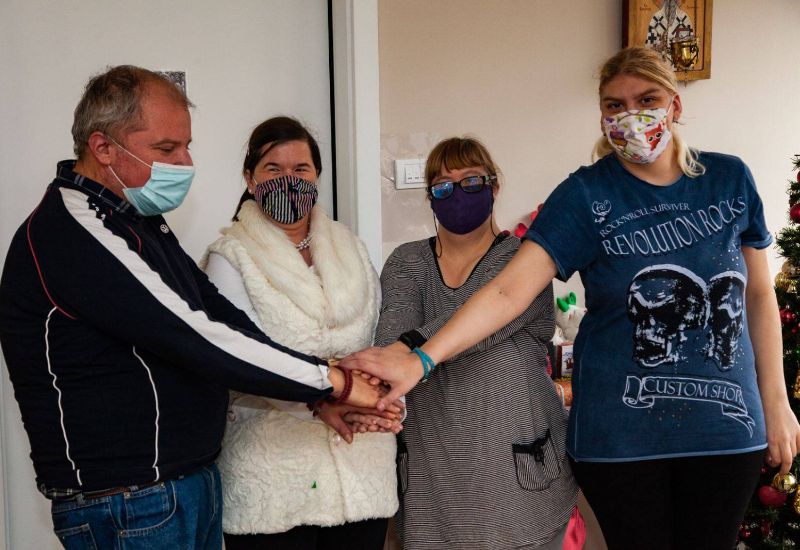

Leave a comment